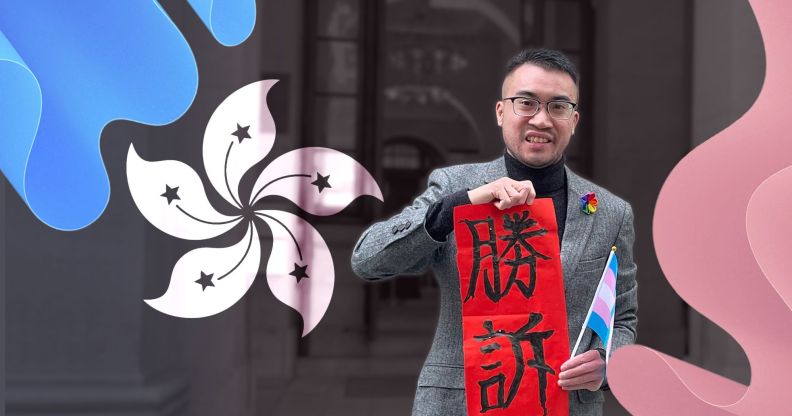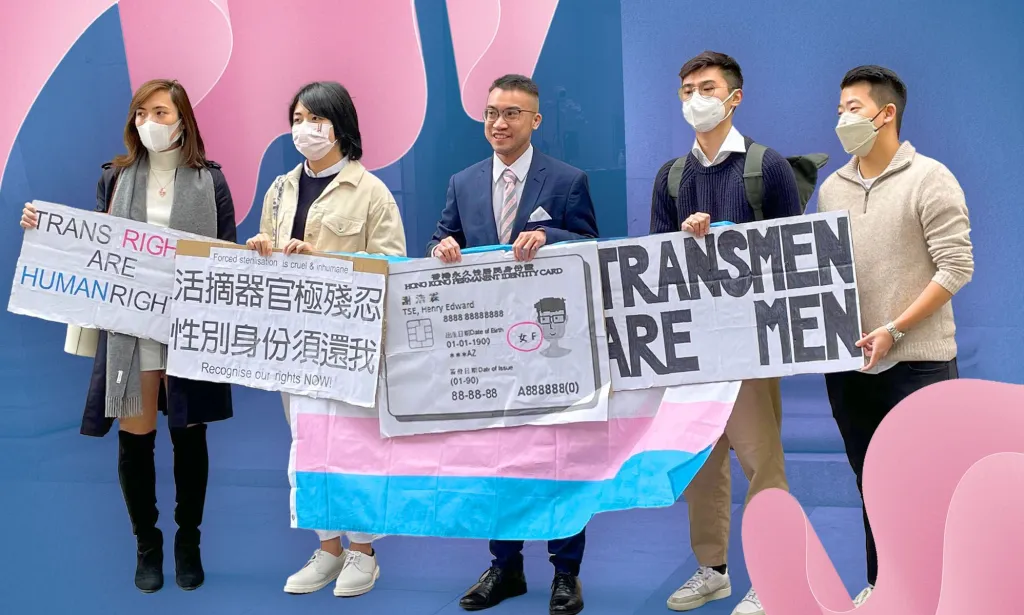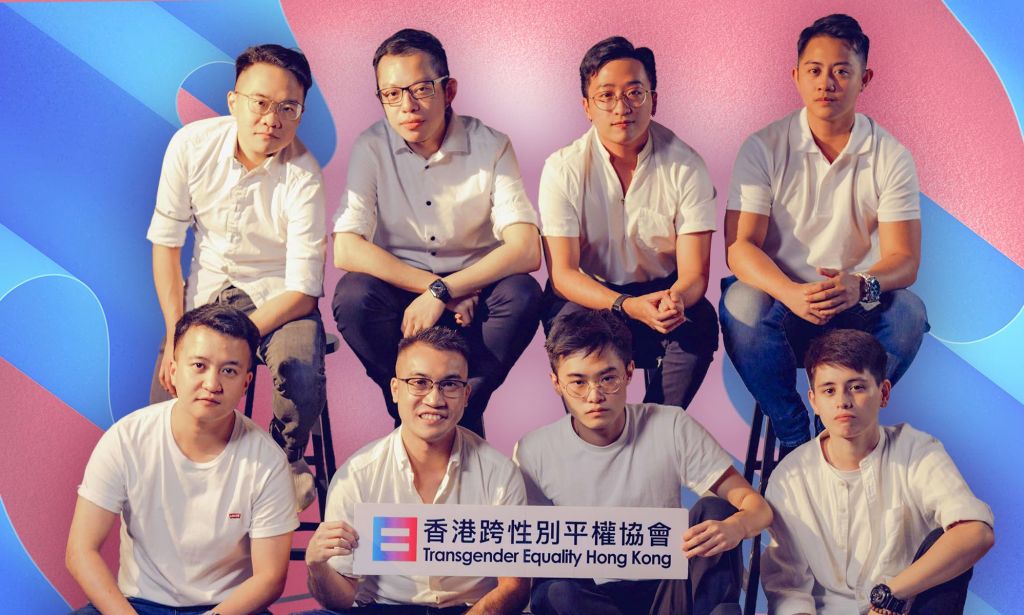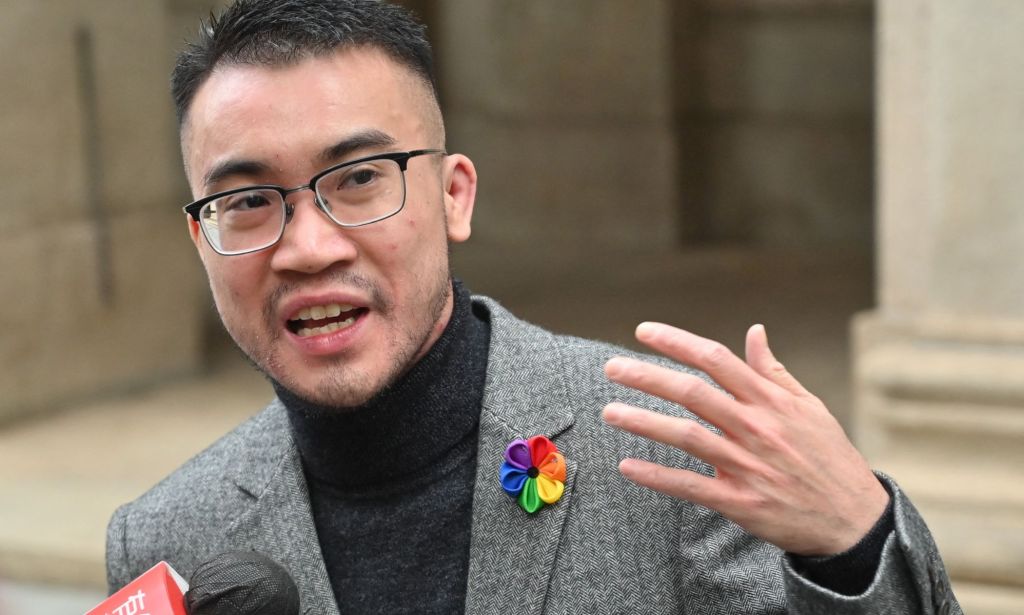Trans man who won historic Hong Kong legal case still can’t ‘live a normal life’

Trans Activist Henry Edward Tse holds up a ‘fai chun’, a decoration for Lunar New Year, with ‘legal victory’ (勝訴) written on the red paper outside Hong Kong’s Court of Final Appeal. (Transgender Equality Hong Kong/Envato)
Henry Edward Tse won a landmark trans rights case in Hong Kong, but archaic laws still make his existence “impossible”.
Tse fought a legal challenge which lasted five years and made it to Hong Kong’s highest court, to have the gender marker on his identity card changed.
All persons in Hong Kong aged 15 and above are required to carry government-issued photo ID on their person at all times – whether it’s a Hong Kong ID card or a passport – and police can demand to see it at any time.
Existing policy requires trans people to undergo gender-affirming surgery before they can have their gender recognised on their ID – for trans men, this means removing their uterus and ovaries, and having a penis constructed.
Tse began his medical transition while living in the UK. He went to a gender identity clinic, changed the gender on his UK passport and even got a Gender Recognition Certificate, which allows trans people to be recognised properly on birth, death, marriage and civil partnership certificates in the UK.
But it was an uphill battle to get the same recognition in Hong Kong.
“I transitioned in the UK more than 10 years ago so the climate back then in the UK is drastically different from what it is now – different government, different prime minister,” Henry tells PinkNews.

“In Hong Kong, a big issue is the lack of legislation. We’ve been talking about this for more than 25 years and we haven’t got any progress.”
He says the structure of Hong Kong’s legislature makes it difficult for bills to pass.
“That’s why you’re seeing an increasing number of court cases right now, including mine. My case should not have happened.”
Tse filed a legal challenge in 2017 to challenge the lack of trans rights in Hong Kong.
In the years since, he’s faced a series of legal setbacks. Several courts ruled against him, some trans-focused NGOs even opposed his lawsuit, and his lawyer suddenly fled Hong Kong last year as the case reached the Court of Final Appeal.
Tse and a person identified only as Q appealed to the final appellate court of Hong Kong over the government’s refusal to change the genders on their ID cards because of their decisions not to go through additional surgeries.
The court ruled in February that full gender-affirming surgery shouldn’t be a prerequisite for trans people to have their gender recognised on their ID cards. In its judgement, the court said the government’s policy was unconstitutional and imposed an “unacceptably harsh burden” on individuals.

Tse describes the ruling as a “staged victory” – he still has no idea how it will be implemented.
“The policy, from the very start, is an arbitrary decision only by the internal people from the government,” he explains. “It has never been reviewed by the legislative council. So we still have a lot of work to do.”
He continues: “I wouldn’t say it’s over from here to when the policy is changed. We still have to push the Immigration Department to speed up and to update the policy to a standard that is in line with international human rights standards.
“That’s work that I urgently need to do. I really gave all my energy into raising awareness for the case because no one was helping me. I didn’t have a lot of room to think, to have feelings.”
The court found Hong Kong’s existing policy created “confusion or embarrassment” for those whose gender identity doesn’t correspond with the marker listed on their card.
It’s something Tse knows all too well – he describes being “outed” as trans every time he presented his ID card, and the legislation is such that he’s “unable to live a normal life”.

“In Hong Kong, the simplest thing like using the public bathroom in the public space, it’s impossible, because it’s illegal for me,” he explains.
“It’s illegal for me to use the male bathroom, and it’s also illegal for me to use the female bathroom because of how I look.
“I’ll scare them [women] by making them feel that they are threatened in some way. It would constitute a crime of loitering in Hong Kong.
“So that means I’m basically unable to live a normal life.
“I try to avoid all gender-segregated facilities. I try not to use the gym. I try not to go swimming, etc. It was just impossible for me to live a normal life.”
Tse’s win is likely to have a far-reaching impact, but it’s not the first time trans rights were discussed in Hong Kong’s top court.
In 2013, the Court of Final Appeal ruled a trans woman, known only as W, had the right to marry her boyfriend after the government barred her union.
Hong Kong doesn’t recognise same-sex marriages, and trans people can’t amend the gender recorded in their birth certificate in order to get married. So the government argued W couldn’t get married as authorities would legally consider her union a same-sex marriage.
The court ruled in W’s favour, but it issued a stay to put the decision of letting W marry her boyfriend on hold for a year to allow time for the government to amend its gender recognition law.
Tse says the court has recognised “gender recognition for trans people is a huge legal gap in Hong Kong” and that there will be “many potential cases coming to the court”.
But he says the government “did nothing in that year” and its consultation has failed to bring forward actual change since the 2013 ruling.

He doesn’t see “things going anywhere” in terms of his activism work in Hong Kong, but thinks it’s important to ‘see hope elsewhere’ to move away from “your local black hole”.
“I think it’s important to make allies outside of where you are because, from my own experience, I got little support from the local movement,” he adds.
“But when I made friends with activists in Taiwan, in Japan who are really experts in judicial activism, it helped a lot. I felt empowered, and they gave me actual help.”
How did this story make you feel?

